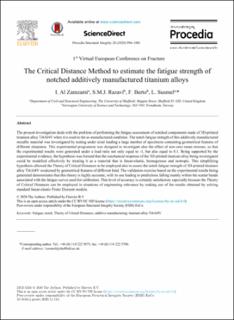| dc.contributor.author | Al Zamzami, I | |
| dc.contributor.author | Razavi, Seyed Mohammad Javad | |
| dc.contributor.author | Berto, Filippo | |
| dc.contributor.author | Susmel, Luca | |
| dc.date.accessioned | 2021-02-18T14:02:05Z | |
| dc.date.available | 2021-02-18T14:02:05Z | |
| dc.date.created | 2021-01-19T14:55:36Z | |
| dc.date.issued | 2020 | |
| dc.identifier.issn | 2452-3216 | |
| dc.identifier.uri | https://hdl.handle.net/11250/2729000 | |
| dc.description.abstract | The present investigation deals with the problem of performing the fatigue assessment of notched components made of 3D-printed titanium alloy Ti6Al4V when it is used in the as-manufactured condition. The notch fatigue strength of this additively manufactured metallic material was investigated by testing under axial loading a large number of specimens containing geometrical features of different sharpness. This experimental programme was designed to investigate also the effect of non-zero mean stresses, so that the experimental results were generated under a load ratio not only equal to -1, but also equal to 0.1. Being supported by the experimental evidence, the hypothesis was formed that the mechanical response of the 3D-printed titanium alloy being investigated could be modelled effectively by treating it as a material that is linear-elastic, homogenous and isotropic. This simplifying hypothesis allowed the Theory of Critical Distances to be employed also to assess the notch fatigue strength of 3D-printed titanium alloy Ti6Al4V weakened by geometrical features of different kind. The validation exercise based on the experimental results being generated demonstrates that this theory is highly accurate, with its use leading to predictions falling mainly within the scatter bands associated with the fatigue curves used for calibration. This level of accuracy is certainly satisfactory especially because the Theory of Critical Distances can be employed in situations of engineering relevance by making use of the results obtained by solving standard linear-elastic Finite Element models. | en_US |
| dc.language.iso | eng | en_US |
| dc.publisher | Elsevier | en_US |
| dc.rights | Attribution-NonCommercial-NoDerivatives 4.0 Internasjonal | * |
| dc.rights.uri | http://creativecommons.org/licenses/by-nc-nd/4.0/deed.no | * |
| dc.title | The Critical Distance Method to estimate the fatigue strength of notched additively manufactured titanium | en_US |
| dc.type | Peer reviewed | en_US |
| dc.type | Journal article | en_US |
| dc.description.version | publishedVersion | en_US |
| dc.source.journal | Procedia Structural Integrity | en_US |
| dc.identifier.cristin | 1874528 | |
| dc.description.localcode | 2452-3216 © 2020 The Authors. Published by Elsevier B.V. This is an open access article under the CC BY-NC-ND license (https://creativecommons.org/licenses/by-nc-nd/4.0) | en_US |
| cristin.ispublished | true | |
| cristin.fulltext | original | |
| cristin.qualitycode | 1 | |

